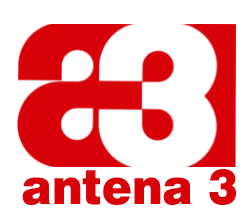
KYSR is a commercial radio station licensed to Los Angeles, California, and owned by iHeartMedia KYSR broadcasts an alternative rock format and is the flagship station of syndicated morning drive time program The Woody Show. The KYSR studios are on West Olive Avenue in Burbank.
Cuatro is a Spanish free-to-air television channel that was launched in November 2005. Owned by Mediaset España, the Spanish subsidiary of the Italian Mediaset group, it is broadcast on TV frequencies licensed to the previous owner PRISA TV in 1990 and previously used by them for the analogue transmission of its pay-per-view channel Canal+.

Radiópolis is a Mexican radio broadcast company that owns AM and FM radio stations in Mexico and syndicates music and talk formats. It is the former radio division of Televisa, which spun its stake off to Corporativo Coral, S.A. de C.V., in 2020 to focus on its core television and telecommunications businesses. Since 2001, Radiópolis has been a joint venture with Spanish media conglomerate Grupo PRISA.

Caracol Radio is one of the main radio networks in Colombia. Founded in Medellín in 1948 when La Voz de Antioquia station acquired the 50% of Emisoras Nuevo Mundo, based in Bogotá.

KRCD is a commercial FM radio station licensed to Inglewood, California, and broadcasting to Greater Los Angeles Area.
La Cadena SER is a Spanish radio network created in 1924; in 2018 the network had a regular listenership of 4,139,000. The acronym SER stands for Sociedad Española de Radiodifusión.
Hoy por hoy is a Spanish radio program, produced by the news department of the Cadena SER. It is the most listened-to radio program in Spain with an average of about three and a half million listeners a day and is considered the most listened-to program in Spanish radio history. Directed and presented by the journalist Àngels Barceló, the program is broadcast from Monday to Friday, from 5:59 am to 12:19 pm, with the later 101 minutes dedicated to local opt-out broadcast from local studios. The program, on news and current affairs, spends the first 4 hours reviewing Spanish and international general information, especially political matters. It features live interviews with the most relevant figures of the day, including the main political leaders and leaders of government. The last two hours and nineteen minutes of the program are more relaxed with sections on different themes, and humour.

Promotora de Informaciones, S.A. (PRISA) is a Spanish media conglomerate headquartered in Madrid, Spain. It is one of the largest media companies in Spain and all of Latin America, producing a wide variety of educational, cultural and informative content. PRISA owns a portfolio of newspapers, magazines, radio stations, and television networks. The majority subsidiaries and brands of the company are El País, Cadena SER, and Santillana.

Cadena Dial is a Spanish radio station. The station belongs to the Spanish media group PRISA. It was founded in 1990 and broadcasts exclusively pop music in Spanish. On 7 April 2017 Cadena Dial began broadcasting on DTT, along with LOS40 and Cadena SER. All of its programming is produced in Madrid, although it could be received throughout Spain. Its format is aimed at a family audience for both young people and adults. It is the second highest rated music station in the country with 2,109,000 listeners, according to the third wave of the EGM in 2019, just behind LOS40. It can be listened to through FM radio, DTT, Internet and its application for mobile devices.
LOS40 TV was a television channel property of LOS40, a radio station in Spain. The channel specialised in music and broadcast music videos throughout the day. The channel was available 24 hours a day through Movistar+ and some cable providers. It started broadcasting on September 1, 1998 and shut down on February 17, 2017.

Máxima FM was the main Spanish top 40-leaning electronic dance music station. It is part of Cadena SER radio stations, owned by PRISA Group. It was founded in 2002 and it is based in Madrid.
LOS40 Music Awards, formerly known as Premios 40 Principales, is an award show by the musical radio station LOS40. It was created in 2006 to celebrate the fortieth anniversary of the founding of the worldwide station.

Antena 3 Radio was a nationwide Spanish radio station opened on 1 February 1982 and closed on 19 June 1994. It served as the basis for the creation of Antena 3 Televisión.
Mar Montoro is a Spanish TV and radio presenter.

XEX-FM is a radio station in Mexico City. Broadcasting on 101.7 MHz from atop the World Trade Center Mexico City, XEX-FM broadcasts the contemporary hit radio format taken from the Los 40 network. The vast majority of the songs played on-air are in English.
Europa FM is a Spanish musical radio station part of the Atresmedia media group. It is based in Barcelona, and it broadcasts throughout Spain on various frequencies. It was launched in 1996 and currently targets the audience between 18-35.

Aitana Ocaña Morales, known mononymously as Aitana, is a Spanish singer, actress, dj and songwriter. She first gained national recognition in 2017, placing as the runner-up in the revival series of the Spanish reality television talent competition Operación Triunfo. While competing on the show, Aitana recorded the single "Lo Malo" with fellow contestant Ana Guerra. The song became an instant hit in Spain, debuting at number-one and holding the spot for several weeks. Following the competition, Aitana signed a 360º record deal with Universal Music and released her debut solo single "Teléfono" to commercial success and streaming-breaking records.
The LOS40 Music Awards 2018 was the thirteenth edition of the LOS40 Music Awards, the annual awards organized by Spanish radio station Los 40. It was held on November 2, 2018 in the WiZink Center in Madrid, Spain.

María de los Ángeles Barceló Suárez better known as Àngels Barceló is a Spanish journalist, presenter and broadcaster specialized in informative and informative programs and magazines with an extensive career in audiovisual media.











